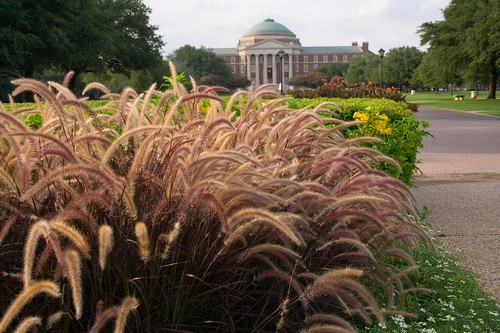Profession and Memory

Going back home always determines a psychological collision between the present and the past. Sometimes those collisions also involve former visions of the future. Home for me is Dallas, Texas, where I grew up, and where I planned my professional career as a politically-engaged historian, insofar as I could imagine such a thing at the time. Today I’m working from the library at Southern Methodist University, where I took classes on medieval politics and theology as a high school student. The past is in the landscape, and it brings me back recollections of other versions of my future.
These tree-lined drives and narrow library stairs are hallowed avenues to me. The wan light and aging archives bring back earlier adventures in the library, the fantasies they inspired of being a professor, and the quaint outline of that future: I was destined, I was sure, to be every bit as articulate, noble, committed, terrifying, and inspiring, as those members of the faculty I saw as a teenager. Walking through them today I'm still overpowered by the whiff of what I saw then: a life of curiosity, of engagement, of wonder. I get tired of my dissertation, as all PhD students tire. Old places, though, have a powerful effect on me. They reconstitute for me some memory of value, infused with a real desire for learning, purpose, and application. Going home is salutory for my sense of the future.
This year, I go on the job market as a British Historian. My dissertation on the highways and streets of industrialization, their cultural and political efficacy (halfway finished), will be sent off to half a dozen universities – History Departments of course, perhaps urban planning and political science departments as well. Political think tanks too. Probably art history and political post-docs. Anything dealing with politics, community, and culture. A wide swath of intellectual territory; a wide trajectory of hope.
Revisiting my hometown is a stark reminder of the reasons I took this path. I believed firmly, as a teenager, that professors were the moral and social equivalent of clergy – the greatest authority figures and intellectuals in our small, Methodist town. Professors were arguers of the world, oracles of justice, interpreters of political struggle. Professors were supposed to be socially worldly, applying their knowledge across the contemporary landscape: they were adept anthropologists, skilled at interpreting contemporary culture in advertisement and song; they were stewards of Aristotle and Augustine for a latter age, interpreting the ancients so as to defend the rights of women and minorities. They were brave, engaged, and learned men, combining wisdom, intelligence, and passion.
This compassion, pluralism, engagement, and curiosity marked out the university faculty from everything else I knew as a southern girl growing up in a Republican town. In Dallas, Texas, the university faculty were the few individuals who could compare Republicans and Democrats with an objective and generous analysis. They could reason about how feminism and civil rights reflected the values of the ancient world. They could demonstrate how social change happened gradually, accumulating out of the instances of writing, activism, and politics of myriad individuals. They were the only people I knew in inward-looking Dallas who could contextualize the prejudiced South, the adventurous Southwest, the idealistic West Coast, the learned East, and embattled Europe, fit to make a Texan aware of her national and global role as a tester of boundaries and translator between Old South and New West. They were my guides, and they became my role-models. At eighteen, comparing such professors with the narrower clergy, schoolteachers, engineers, and accountants who filled my parents’ middle-class life in Dallas, Texas, SMU’s professors’ worldliness, dedication, and experience filled the greatest figure I could describe by way of a well-lived life.
From Dallas, and from a kind of adolescent hero-worship of those professors, I went on to Harvard, Cambridge, and Berkeley: to new political horizons, new battlegrounds, new friends, and new alliances. My studies changed from the classics to continental philosophy to history; my mentors from worldly Southerners to idiosyncratic Yankees to agnostic Californians; my politics from communitarian Methodist to socialist to classical liberal. What remained across that individual journey was one general cast of mind I’d learned at eighteen: a respect for the intellectual who tried her best to respond to politics, and to engage her community. I left Texas at eighteen, impressed to my guts with the intellectuals who managed that in this reclusive and tradition-oriented place. Come Autumn, I’ll be entering the job-market with the same agenda: politics, mind, and community.
Academia, politics, and community are the crux of my writing, my life, and my intention. I’ve spent the past five years building my relationships with activists, applying myself to problems of political participation and rule, and reconfiguring my intellectual interests to reflect on the contemporary political landscape. In the same timeframe, I’ve also been drilling myself in the methods and practices of well-written history, aiming to become a story-teller of those narratives that help us establish where we are in relation to our ancestors, ideologues, and forebears.
Simply put: I read the newspaper. I correspond with friends in politics. I give talks in the community. I write history. At 28, this is one woman’s approximation of the ideals she fixed in her mind at 18. Ten years of study, ten years of commitment, and ten years of love: preparation for a lifetime of thinking, work, and engagement.










3 Comments:
Guys.Thanks a lot for this blog. It helped me during passing my midterms in the college.COOOOLLLL!!!
8 Random Things... tag! You're it. Check out my blog to see the rules.
this is a wonderful blog. I'm going to try to some of your blog entries on research to my syllabi (http://www.la.wayne.edu/polisci/kdk). Good luck on the job market. I wish my department had an opening this year!
Post a Comment
<< Home